General questions beginspublished at 11:40 GMT 31 January 2019
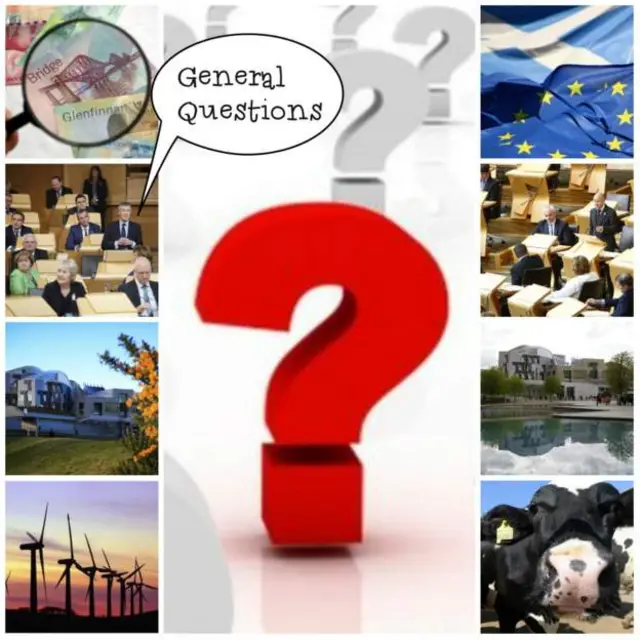 Image source, PA/Getty
Image source, PA/GettyThe Europe committee is taking evidence on Brexit and Northern Ireland
Extensive coverage of first minister's questions
A Labour MSP leads a debate on women in STEM
MSPs debate the Budget Bill for the first time
Craig Hutchison and Louise Wilson
 Image source, PA/Getty
Image source, PA/Getty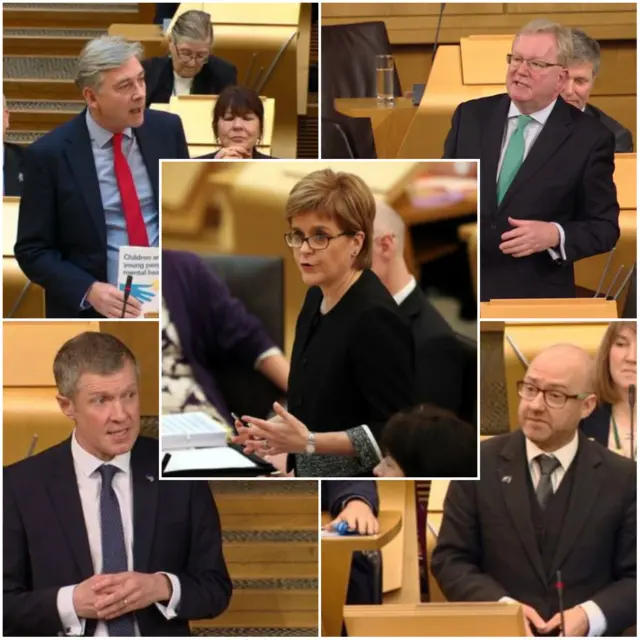 Image source, BBC/PA
Image source, BBC/PAAfter general questions, we will provide extensive coverage and reaction of first minister's questions from noon.
Then Labour MSP Iain Gray will highlight a recent report on women in STEM.
After lunch is the event we've all been waiting for - the first stage of the Budget Bill.
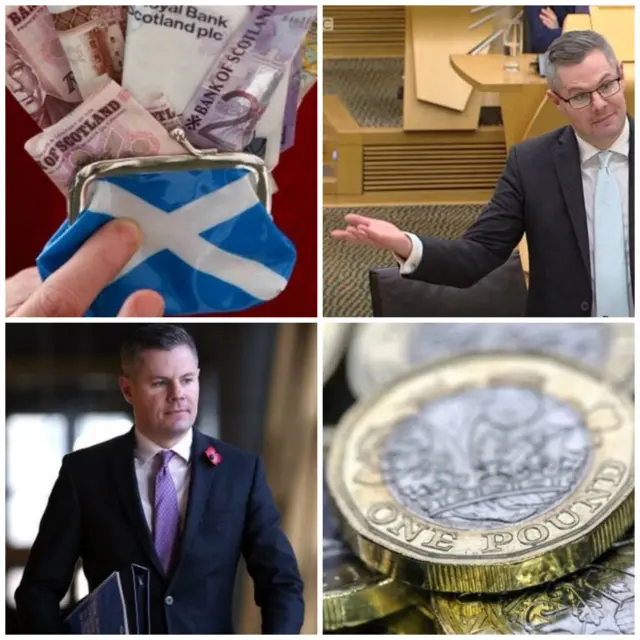 Image source, bbc/PA/Getty Images
Image source, bbc/PA/Getty ImagesThe Stage One debate on the budget kicks off at 2.30pm
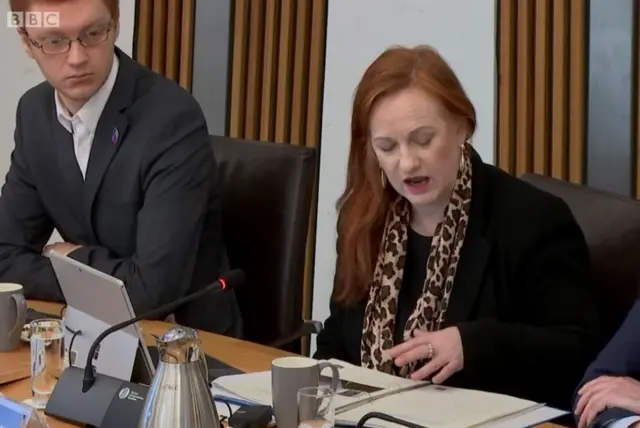
Convener Joan McAlpine wonders if there is enough of an understanding of no-deal in the UK.
Dr Katy Hayward says there does seem to be a sense from some quarters that we could just decide not to operate a border, "but of course it doesn't work that way".
There's a real risk to undermining legitimate businesses and increasing the black market, she warns.
The committee draws to a close.
Dr Hayward says primarily the concern for the Irish government has been avoiding a hard border, but in terms of economics, trade across the Irish Sea is far more important.
Mr Connelly moves on to say that all sides want to avoid no deal, but adds it is a very delicate balancing act.
Dr Hayward points out European Commission president Jean-Claude Juncker has continually pointed out Ireland's border is the EU's border and it will be respected.
Allow X content?
This article contains content provided by X. We ask for your permission before anything is loaded, as they may be using cookies and other technologies. You may want to read X’s cookie policy, external and privacy policy, external before accepting. To view this content choose ‘accept and continue’.
 John Campbell
John Campbell
BBC News NI Economics and Business Editor
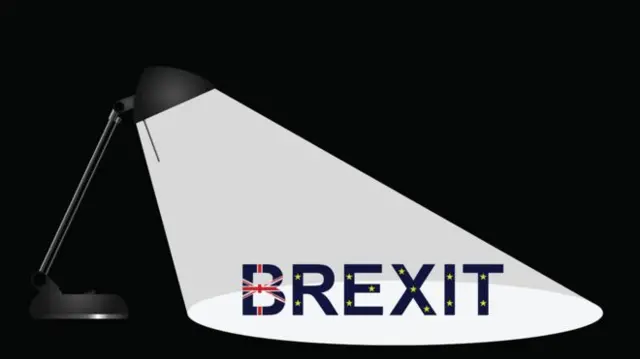 Image source, Getty Images
Image source, Getty ImagesA key part of the Brexit negotiations was about the border that separates Northern Ireland and the Republic of Ireland.
EU leaders approved a withdrawal deal, external with the UK that includes an agreement on the Irish border in November.
Both sides committed to avoiding the return of a "hard border" - physical checks or infrastructure - after Brexit.
This is where the controversial "backstop" comes in.
Go on then, what is the backstop?
The backstop is a position of last resort, to maintain an open border on the island of Ireland in the event that the UK leaves the EU without securing an all-encompassing deal.
At present, goods and services are traded between the two jurisdictions on the island of Ireland with few restrictions.
The UK and Ireland are currently part of the EU single market and customs union, so products do not need to be inspected for customs and standards.
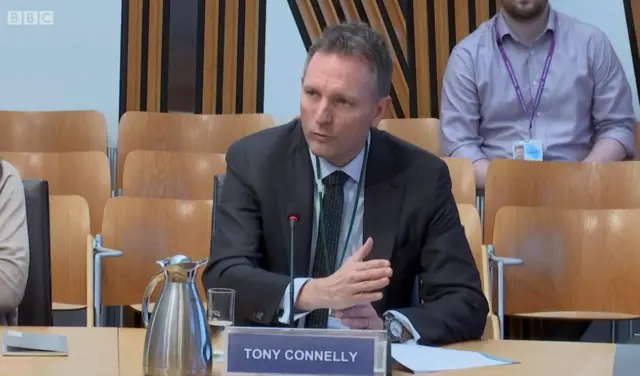
Tony Connelly suggests Theresa May seems to be doing whatever she can do to get her deal across the line in the House of Commons.
She must have factored in that the EU is not going to agree to the changes she is looking for, adds Mr Connelly.
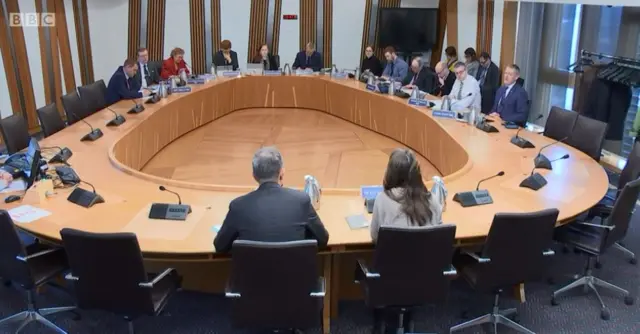 Image source, bbc
Image source, bbcTony Connelly from RTE News says the view in Brussels is that Theresa May has essentially become a hostage to the DUP and ERG.
That will create a lot of resistance with Brussels, he says.
The RTE Europe editor points out there is no doubt at all that there area strong concerns about a no deal Brexit.
It is almost impossible that they will look again the Northern Ireland arrangements, agrees Dr Katy Hayward.
Allow X content?
This article contains content provided by X. We ask for your permission before anything is loaded, as they may be using cookies and other technologies. You may want to read X’s cookie policy, external and privacy policy, external before accepting. To view this content choose ‘accept and continue’.
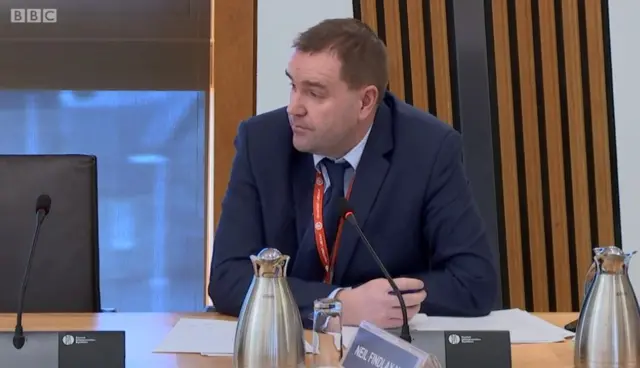
Labour MSP Neil Findlay
Labour MSP Neil Findlay asks whether there is unity in the Irish parliament behind the Taoiseach's position.
Mr Connelly says there is and Irish parliamentarians are keeping pressure on Leo Varadkar to stick to the red lines.
Have people's voices been excluded in Northern Ireland become the assembly isn't sitting, asks Mr Findlay.
Dr Katy Hayward says it would have been far better to have the assembly up and running, as the sense of uncertainty has only been exacerbated.
Tony Connelly from RTE News says the tone from the Irish government has become more exasperated and sharp.
Mr Connelly says the Irish economy faces huge exposure if there is no deal, so the government has been making contingency plans.
He points out the issues at the Irish border are binary, you are either in one customs union or you are not and if that is the case there will have to be checks.
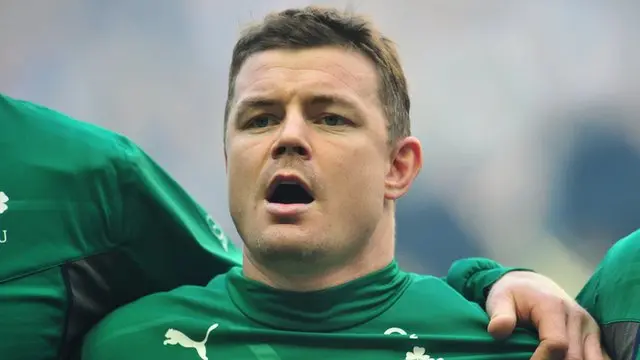 Image source, bbc
Image source, bbcFormer Irish captain Brian O'Driscoll
Lib Dem MSP Tavish Scott says Tory MPs should watch Brian O'Driscoll's documentary Shoulder to Shoulder about the united Ireland rugby team.
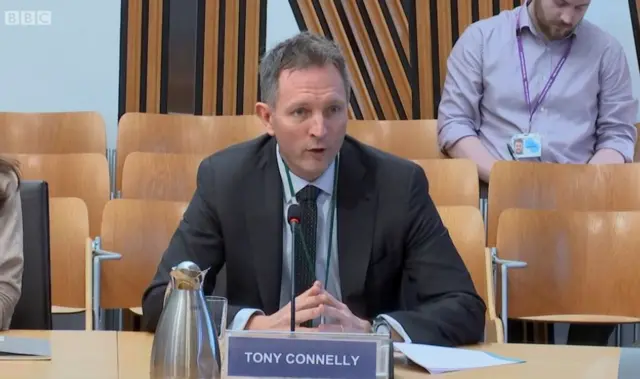
We are only guessing at the moment at what the "alternative arrangements" MPs backed earlier this week are, says Tony Connelly from RTE News.
It seems they are re-looking at things like technology or situating checks slightly apart from the border, he tells the committee.
The backstop is an insurance policy because the technology does not exist yet, he adds.
Dr Katy Hayward of Queens University Belfast suggests the idea of a hard border and the peace process are very much connected in people's minds.
We must acknowledge that some of the solutions to avoid a hard border cannot be technological, she states.
Allow X content?
This article contains content provided by X. We ask for your permission before anything is loaded, as they may be using cookies and other technologies. You may want to read X’s cookie policy, external and privacy policy, external before accepting. To view this content choose ‘accept and continue’.
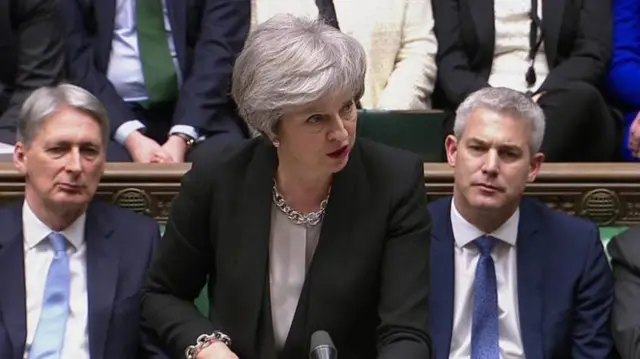
Theresa May was speaking at Prime Minister's Questions on Wednesday
The PM says she stands "fully behind" the Good Friday Agreement, having been accused of ripping it up over Brexit.
The SNP accused the Tories of tearing up the deal ending decades of violence in NI, by voting for the UK to seek alternative arrangements to the border backstop.
But Theresa May said everything she did would be in line with her government's commitments to the 1998 peace treaty.
Labour has said it is not clear what are the alternatives to the backstop.
The referendum has caused enormous problems between the Irish government and the DUP, says Mr Connelly.
The RTE's Europe editor says things have drifted apart and the backstop has became an "orange and green issue".
He says when the British PM met the Irish PM in 1973, it was the first time such a meeting has happened in 50 years, and this was after the UK joined the EEC.
The withdrawal agreement facilitates dialogue between the UK and Ireland; if the backstop is activated, a committee will be formed, says Mr Connelly.
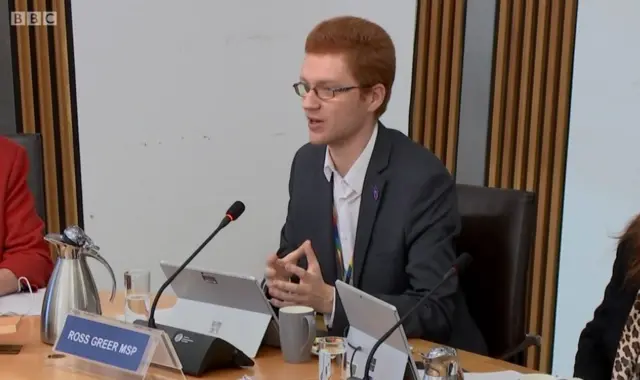
Green MSP Ross Greer
Green MSP Ross Greer suggests representation of Northern Ireland in these negotiations has been boiled down to just the DUP.
What is this doing to the future of the peace process, he asks.
The Good Friday Agreement was about building a trusting relationship between the UK and Ireland, explains Dr Katy Hayward.
Dr Hayward suggests there is a "perfect storm" in relation to the agreement, both because the Northern Ireland Assembly is not sitting at the moment and the relationship between the Irish and UK governments is "fraught".
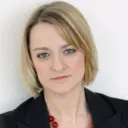 Laura Kuenssberg
Laura Kuenssberg
BBC political editor
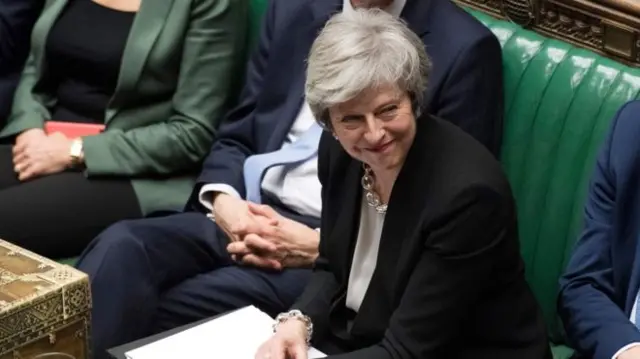 Image source, Getty Images
Image source, Getty ImagesWhen things seem confusing, make a list.
Theresa May was heading for another defeat, but she ended up with an unconventional win - a win nonetheless.
The Tory Party that was visibly split in two a fortnight ago is giving the impression of being largely united, even if that is temporary.
Yet the prime minister only won because she gave into Brexiteer and DUP demands, by making a promise that she can't be sure she can keep - one the EU says at the moment is impossible.
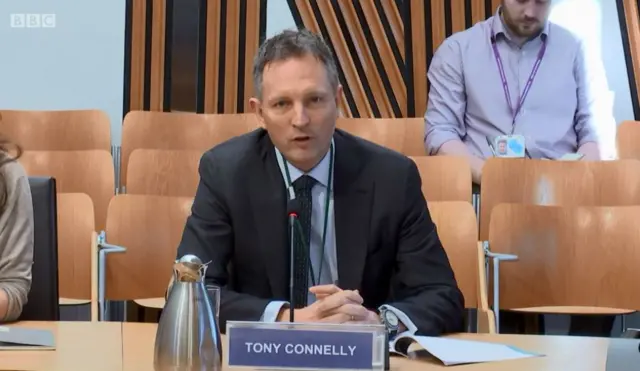 Image source, bbc
Image source, bbcTony Connelly from RTE News
Tony Connelly from RTE News reiterates the commitment to no infrastructure and no hard border between Northern Ireland and Ireland.
Mr Connelly pivots to the technology that can be used to mitigate post-Brexit delays at Calais and Dover, including the use of barcodes on the move.
However a declaration will still have to be filled, requiring manpower, he explains.
Mr Connelly says it will only be big companies that will be able to mitigate issues at the Irish border, it won't be suitable for small SMEs that go back and forth across the border.
BBC News NI's political reporter Jayne McCormack explains why the border is an issue